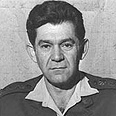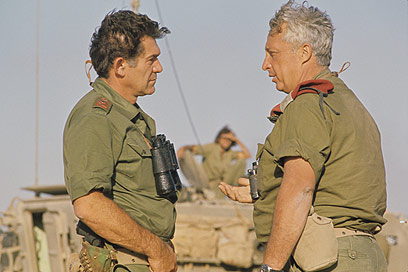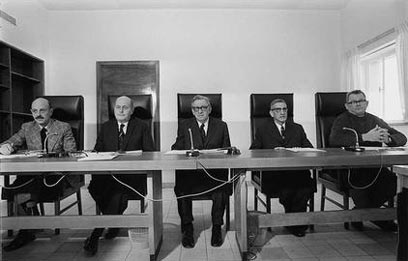
Ex-IDF chief's testimony reveals truth hidden from public
Full transcripts of Agranat Commission show David Elazar felt greatly mistreated after paying price for failures of Yom Kippur War
On the committee interim statement released on April 1974, it recommended Elazar should be dismissed due to personal accountability for failure to assess the situation and the IDF lack of readiness to war.
Related Stories:
- Declassified documents reveal failures of Yom Kippur War
- Moshe Dayan's grave desecrated on anniversary of death
- The shattered myth of Moshe Dayan
Elazar felt he was greatly mistreated. He said: "I completely believe that my actions and tactics as chief of staff were absolutely reasonable throughout this war. Since this committee has laid a most heavy criticism over my actions I would appreciate it showing the bright sides of my actions not only the shadows."

David Elazar and Ariel Sharon (Photo: David Robinger)
During the initial committee hearing in January 1974, Elazar claimed the policy of then-Egyptian President Saadat was "deciding to not decide; war slogans on the one hand with awareness of no viable Egyptian military option on the other, therefore I claimed there may be only one thing Saadat would wish to achieve.
"He knows he can't conquer the Sinai Peninsula, he knows the Syrians can't conquer the Golan Heights, he knows he can't surprise us the same way we surprised him in 1967 and indeed he didn't surprise us as much, though it was more than I expected.
"I said over the discussion he could only hope that a joint Egyptian - Syrian attack will enable him to keep a dunam here or a dunam there. My assessment was unfortunately almost an accurate description of what happened in October."

Agranat commission members (Photo: Yaacov Sa'ar GPO)
The Agranat commission members asked Elazar why the IDF didn't keep the highest alert status, he replied: "On one of the assessments during 1972, I have ordered the Headquarters to invest more resources in enhancement and not in the day-to-day alertness.
" It could supposedly be said that keeping the IDF at constant high alert is better, but on the other hand it could have caused the IDF to be underprepared for the day it was put to the test, if that day came years later."
The chief of staff continued saying: "On April 1973 we received serious news of a possible war erupting on summer. As it came from a good source an intelligence assessment was conducted which stated there are slim chances of war and on several cases even very slim chances. In our terminology slim chances mean 'will not happen."
Elazar with Soldiers during the war (Photo: IDF Spokesperson Unit)
He further added: "I was less confidant of the slim chances assessment. The Director of Military Intelligence gave his assessment of slim chances on several occasions and on all of them we differed – my attitude was it is the first time since 1967 probability of war is on the rise.
"I too didn't classify it as high but while The Director of Military Intelligence said it is very highly unlikely I said I agree it is low but still the highest since 1967.
"My message to the Prime Minister was that Egypt is thinking about war, speaking about war and eventually there will be war. As a result, in 1973 I reached the conclusion we need to increase alert in face of a possible war in summer.
"During that time I initiated a military operation designed to increase our readiness to war on all areas which have cost us 60 Million shekels over the existing budget. In any case I thought we would always have basic warning so they won't stand a chance."
During the committee's hearing the subject of the IDF knowledge about Egypt's plan to hold a large scale military drill was discussed, questioning why this knowledge didn't serve as a warning sign.
Elazar replied: "The Military Intelligence assessment was that Egypt is holding a drill but has no war aspirations and I claimed Syria will not attack solo – I have repeated that over and over.
"The reason we assumed the Egyptian drill will not turn into war was the Military Intelligence certainty. It was not the first time a drill was performed and Military Intelligence knew how it would look. I can state from my recollection that at a certain point we informed the Prime Minister about the drill, she asked about the drill's procedure and MI told her it will include brigades' maneuvers and so on and so forth, as we know how it is done."
Shimon Agranat, the Commission Chairman asked:" Military Intelligence received news from a credible source there will be war on 1 October. Isn't it mandatory MI should bring it to your knowledge?"
Elazar blamed the Chief of Military Intelligence, Eli Zeira:"There is no order IM must forward news to me, it is ordered to submit its assessments. Therefore in the case of such news taken by him seriously he must forward it to me. It is not a case of formal misconduct but it is a defect, a lack of common sense."
- Receive Ynetnews updates directly to your desktop











